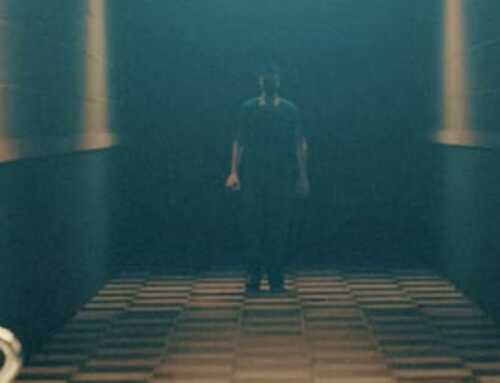There’s something about madness and isolation that seem to go hand in hand. Whether it be in the form of stir-craziness, cabin fever, or even full-blown insanity, cinema has taught us that seclusion can have profoundly devastating effects on the human psyche, and that is exactly what The Wind means to tap into.
Directed by Emma Tammi from a script by Teresa Sutherland, The Wind is a Western-tinged psychological horror film that follows frontierswoman Lizzy (Caitlin Gerard of Insidious: The Last Key) who struggles to determine if the unseen force terrorizes every time her husband is away are real or a product of her imagination. Driven by rich atmospherics, effective performances, and jarring, non-linear story mechanics, The Wind confidently establishes itself as a memorable, female-driven descent into madness.
From the very first frame, the audience is introduced to oppressively sprawling plot of land where Lizzy and her husband Isaac (Ashley Zukerman) reside in all of its isolating glory. Save for one other, previously occupied cabin, there isn’t another home around for miles and that level of seclusion is palpably oppressive. Coupled with the muted color palette, elegantly composed cinematography, and eerily quiet sound design, the film captures the loneliness, dourness, and ominous nature of extreme seclusion. The atmosphere here is incredibly effective, and it renders the dour nature of isolation beautifully.
Amidst the lonely, dread-drenched atmosphere is an admittedly familiar story told in an unconventional way. With every paranormal incident, the audience is spurred to question whether our heroine is really under attack or if she is merely losing her grip on reality. While this could (and occasionally does) make for perfunctory haunted house fare, Tammi and Sutherland chose to weave this tale in a jarring, nonlinear fashion. The opening scene depicts the burial of Lizzy’s pregnant neighbor, Emma (Julia Goldani Telles), before flashing back to when she and her husband Gideon (Dylan McTee) moved into the nearby cabin just a few scenes later. The film constantly obfuscates its timeline, constantly bouncing between events that took place at a variety of different times, and this allows the plot to progress in a very jarring manner. While this story construction might be off-putting or even occasionally frustrating, it mirrors and heightens the fragmented, deteriorating nature of our protagonist’s psyche. It’s a choice that might turn off some prospective viewers, but it pairs well with Lizzy’s slide into insanity.
It certainly helps that the cast at the center of this tangled story capably navigates their roles. The Wind truly places the spotlight on its leading ladies, and they confidently deliver. Julia Goldani Telles is delightfully unhinged as Emma, who becomes progressively disturbed as the dark forces at play test her sanity. That said, the clear-cut star of the show is undoubtedly Caitlin Gerard. Spending much of the runtime by herself, Gerard capably imbues Lizzy with strength and resourcefulness as well as vulnerability and loneliness. Her performance is gripping and intense, nailing the emotional beats and psychological turbulence of her character, and proves herself to be a powerhouse in this role.
To put it simply, The Wind treats viewers to an eerie and engaging mood-piece that is bolstered by its strong female characters and distinctive atmosphere. While its nonlinear structure might frustrate some, the film is an effective depiction of the paranoia and insanity that accompanies isolation that is heightened by a truly powerful lead performance. For these reasons alone, you shouldn’t let this one blow away from you.
| The Wind | ||
| RATING: | R | The Wind - Official Trailer I HD I IFC Midnight |
| Runtime: | 86Mins. | |
| Directed By: |
|
|
| Written By: |
|
|







